- Home
- Dan Simmons
Ilium t-1 Page 12
Ilium t-1 Read online
Page 12
Now with my enhanced vision—enhanced by the contact lenses from the gods—I can see Athena across the milling no-man’s-land of lances, preparing Tydeus’ son, Diomedes, as a killing machine. I mean this almost literally. Like the gods themselves, and like me, Diomedes the man will now be part machine, his eyes and skin and very blood enhanced by nanotechnologies from some future age far beyond my short life span. In frozen time, Athena sets contact lenses similar to mine in the Achaean’s eyes, allowing him to see both the gods and, somehow, to slow time a bit when he concentrates in the thick of the action, thus—to the unenhanced onlooker’s view—increasing his reaction time threefold. Homer had written that Athena had “set the man ablaze,” and now I understand the metaphor; using the nanotechnology embedded in her palm and forearm, Athena is busy turning the neglible, latent electromagnetic field around Diomedes’ body into a serious forcefield. In the infrared, Diomedes’ body and arms and shield and helmet suddenly blazed “with tireless fire like the star that flames at harvest.” I realize now, watching Diomedes glow in the thick amber of god-frozen time, that Homer must have been referring to Sirius, the Dog Star, rising as the brightest star in the Greek (and Trojan) sky in late summer. It is in the eastern sky this night.
As I watch, she also injects billions of nanotech molecular machines into Diomedes’ thigh. As always with such a nano-invasion, the human body deals with it as an infection and Diomedes’ temperature goes up at least five degrees. I can watch the invading army of molecular machines moving up his thigh to his heart, from his heart to his lungs and arms and legs again, the heat making his body glow even more brightly in my infrared vision.
All around me, battlefield death is held in abeyance these stretched minutes. Ten yards to my left, I see a chariot frozen in a bubble of dust and human sweat and equine saliva. The Trojan charioteer—a short, even-tempered man named Phegeus, son of Troy’s foremost priest to the god Hephaestus and brother to stout Idaeus; in my morphed disguises, I had broken bread and drunk wine with Idaeus a dozen times in the past few years—is petrified in the act of leaning over the front of his chariot, the chariot rim in his left hand, a long throwing spear in his right. Ideaus stands next to his brother, frozen in the act of whipping on the motion-halted horses while clutching the rigid reins in his other hand. The chariot has been halted in the act of bearing down on Diomedes, all the human players here unaware that the goddess Athena has stopped everything while she plays dolls with her chosen champion, dressing Diomedes in forcefields and thru-view contact lenses and nano-augmenters like some pre-teen girl playing with her Barbie. (I remember a small girl playing with Barbie dolls, perhaps a sister from my own childhood. I don’t believe I had a daughter of my own. I’m not sure, of course, because the memories returning over the past months are like shards of glass with clouded reflections in them.)
I am close enough to the chariot to see the exultation of combat chiseled into Phegeus’ tanned face, and the fear frozen into his unblinking brown eyes. If Homer reported all this correctly, Phegeus will be dead in less than a minute.
I see other gods flocking to the battle site now like carrion crows to slaughter. There is Ares, god of war, flicking into solidity on my side of the battle lines, stepping close to the time-halted chariot holding Idaeus and his doomed brother. Ares palms open his own forcefield behind the frozen chariot carrying the two brothers toward death.
Why does Ares care what happens with these two? True, Ares is no lover of the Greeks—he has obviously learned to hate them in this war and kills them through his instruments or his own agency when he can—but why this obvious concern about Phegeus or his brother Idaeus? Is it just a countermove to Athena’s strategy of enabling Diomedes? This chess game with real human beings falling and screaming and dying has grown old to me, an obscenity. But the strategy still intrigues me.
Then I remember that the god of war is half-god-brother to Hephaestus, the god of fire, also born to Zeus’s wife, Hera. Phegeus’ and Idaeus’ father, Dares, has performed long and faithful service to the fire god within Troy’s walls.
This idiot war is more complicated and senseless than the Vietnam War I half remember from my youth.
Suddenly Aphrodite, my new spymaster and boss, QT’s into existence thirty yards to my left. She’s also here to help the Trojans and to enjoy the slaughter. But—
In the last slowed seconds before real-time resumes, I remember that if the actual fighting goes the way of the old poem, Aphrodite herself will be injured by Diomedes in the coming hour. Why would she come down to the fray knowing that a mortal will wound her?
The answer is the same that I’ve been reminded of so forcibly over the past nine years, but now the fact of it hits me with the force and flash of a nuclear explosion—The gods don’t know what will happen next! None but Zeus, it seems, is allowed to peer ahead at Fate’s checklist.
All of us scholics are aware of this—we are not allowed, by Zeus’s prohibition, to discuss future events with the gods and they are forbidden to ask us about the future books of the Iliad. Our task is only to confirm after the fact that Homer’s Iliad has been truthful to the events of the day we are tasked to observe and record. Many’s the time that Nightenhelser and I, while watching the little green men haul their face-stones toward the shore as the sun sets behind the sea to the west, have commented on this paradox of the gods’ own blindness to coming events.
I know that Aphrodite will be injured this day, but the goddess herself does not. How can I use this information? If I were to tell Aphrodite, Zeus would know—I don’t know how he would know, but I know he would—and I would be atomized and Aphrodite punished in some lesser way. How can I use the information that Aphrodite, the goddess giving me these gifts to spy with, will be—may be—injured by Diomedes this day?
I don’t have time to find the answer. Athena finishes her fussing with Diomedes and releases her grip on space and time.
Real light and terrible noise and violent motion resumes. Diomedes steps forth, body and face and shield blazing, the light evidently apparent even to the other mortals, visible to his fellow Achaeans and the opposing Trojans.
Idaeus completes the motion of lashing his horses forward. The chariot roars and rumbles toward the Greek line, directly at the startled Diomedes.
Phegeus hurls his spear at Diomedes. The spear misses by an inch, the spearpoint passing over the son of Tydeus’ left shoulder.
Diomedes, skin flushed, forehead blazing with fever-sweat and battle heat, hurls his own spear. It flies true, catching Phegeus dead-center in the chest—“between the nipples,” I think Homer had sung it in Greek—and Phegeus is flung backward off the chariot, striking the ground and cartwheeling several times, the spear breaking off and splintering as the corpse tumbles to a stop in the dust of the chariot he had been riding five seconds before. Death, when it comes, comes fast on the plains of Ilium.
Idaeus leaps off the chariot, rolls, and struggles to his feet, sword in hand, prepared to protect his brother’s body.
Diomedes snatches up another spear and rushes forward again, obviously ready to spit Idaeus the way he has just slaughtered the young man’s brother. The Trojan turns to flee—leaving his brother’s body behind in the dust in his panic—but Diomedes throws strong and true, casting the long spear at the center of the running man’s back.
Ares, the god of war, flies forward—literally flies forward, using the same type of levitation harness the gods have issued me—and pauses time again, protecting Idaeus from a flying spear now frozen not ten feet from the running man’s back. Then Ares extends his forcefield around Idaeus, resuming time long enough for the energy field to deflect Diomedes’ spear. Then Ares quantum teleports the terrified man off the battlefield completely, sending him somewhere safe. To the shocked and terrified Trojans, it is as if a blink of black night has snatched their comrade away.
So that Ares’ brother Hephaestus, the fire god, will not have lost both his future priests, I think, but then lurch
backward to safety as the battle resumes and more Greeks follow Diomedes into the breach created by the killing of Phegeus. The empty chariot bounces across the rocky plain, and is captured by cheering Achaeans.
Ares is back now, QTing into semisolidity, a tall godshape as he tries to rally the Trojans, shouting in a godvoice for them to regroup and fend off Diomedes. But the Trojans are split—some running in terror at the approach of blazing Diomedes, some turning in obedience to the war god’s booming voice. Suddenly Athena levitates across the heads of Greeks and Trojans, seizes Ares’ wrist, and whispers urgently to the furious god.
The two QT away.
I look to my left again and the goddess Aphrodite—invisible to the Greeks and Trojans struggling and cursing and dying around her—motions with her hand for me to follow them.
I pull down Death’s Helmet and become invisible to all the gods except Aphrodite. Then I trigger the medallion around my neck and QT after Athena and Ares, following their passage through space-time as easily as I would follow footprints in wet sand.
It’s easy being a god. If you have the right equipment.
They have not teleported far, only about ten miles, to a shaded place along the banks of the Scamander, the gods call it the Xanthus—the broad river that runs across the plains of Ilium. When I QT into solidity about fifteen paces from them, Ares’ head snaps around and he stares right at me. For an instant I know that the Hades Helmet has failed, they see me, and I am dead.
“What is it?” asks Athena.
“I thought I . . . felt something. A stir. A quantum stir.”
The goddess turns her gray eyes in my direction. “There’s nothing there. I can see in all the phase-shift spectra.”
“I can as well,” snaps Ares and turns his gaze away from me. I let out a shaky breath as silently as I can; the Hades Helmet still cloaks me. The god of war begins pacing up and down the river’s edge. “Zeus is everywhere these days.”
Athena walks beside him. “Yes, Father is angry at us all.”
“Then why do you provoke him?”
The goddess stops. “Provoke him how? By defending my Achaeans from slaughter?”
“By preparing Diomedes to do slaughter,” says Ares. I notice for the first time the reddish tint to the tall, perfectly muscled god’s curly hair. “This is a dangerous thing you do, Pallas Athena.”
The goddess laughs softly. “We’ve been intervening in this battle for nine years. It’s the Game, for God’s sake. It’s what we do. I know that you plan to intervene on your beloved Ilium’s behalf this very day, slaughtering my Argives like sheep. Is this not dangerous—this active participation by the god of war?”
“Not as dangerous as arming one side or the other with nanotech. Not as dangerous as retrofitting them with phase-shift fields. What are you thinking, Athena? You’re trying to turn these mortals into us—into gods.”
Athena laughs again but puts on a serious expression when she notices that her laughter only makes Ares more angry. “Brother, my augmentation of Diomedes is short-lived, you know that. I want only for him to survive this encounter. Aphrodite, your darling sister, has already urged on the Trojan archer Pandarus to wound one of my favorites—Menelaus—and even as we speak, she’s whispering in the archer’s ear—Kill Diomedes. ”
Ares shrugs. I know that Aphrodite is his ally and his instigator. Like a pouting little boy—an eight-foot-tall pouting little boy with a pulsing energy field—he finds a smooth stone and skips it across the water. “What does it matter if Diomedes dies today or next year? He’s mortal. He’ll die.”
Now Athena laughs without embarrassment. “Of course he will die, my dear brother. And of course a single mortal’s life or death is of no consequence to us . . . to me. But we must play the Game. I’ll not let that bitch-whore Aphrodite change the will of the Fates.”
“Who among us knows the will of the Fates?” snaps Ares, still pouting, his arms folded across his powerful chest.
“Father does.”
“Zeus says he does,” says the god of war with a sneer.
“Are you doubting our lord and master?” Athena’s tone is almost, not quite, light and teasing.
Ares looks around quickly, and for a second I fear I’ve given myself away by making a noise where I stand on a flat boulder, afraid to leave footprints in the sand. But the war god’s gaze moves on.
“I show no disrespect to our Father,” Ares says at last, his voice reminding me of Richard Nixon’s when he was speaking into the hidden Oval Office microphone he knew was there. Putting his lies on the record. “My allegiance and loyalty and love all go to Zeus, Pallas Athena.”
“Which our Father must certainly note and reciprocate,” responds Athena, no longer hiding the sarcasm in her voice.
Suddenly Ares’ head snaps up. “God damn you,” he shouts. “You just brought me here to get me away from the battlefield while your cursed Achaeans kill more of my Trojans.”
“Of course.” Athena launches the two syllables as a taunt, and for a second I think I’m going to witness something I’ve not seen in my nine years here—a direct battle between two gods.
Instead, Ares kicks sand in a final show of petulance and QT’s away. Athena laughs, kneels by the Scamander, and splashes cold water on her face. “Fool,” she whispers—to herself, I presume, but I take it as a statement directed at me protected here only by the Hades Helmet’s distortion field; “Fool” seems to me an accurate judgment of my folly.
Athena QT’s back to the battlefield. After a minute devoted to trembling at my own foolishness, I phase-shift and follow.
The Greeks and Trojans are still killing each other. Big news.
I seek out the only other scholic visible on the field. To the unaided eye, Nightenhelser is just another slovenly Trojan foot-soldier hanging back from the worst of the fighting, but I can see the telltale green glow the gods have marked us scholics with even when we’re morphed, so I take off the Hades Helmet, morph into the form of Phalces—a Trojan who will be killed by Antilochus by and by—and I walk over to join Nightenhelser where he stands on a low ridge looking down on the carnage.
“Good morning, Scholic Hockenberry,” he says when I approach. We’re speaking in English. No other Trojan is near enough to hear us over the clash of bronze and the rumble of chariots and both of these motley coalitions are used to odd tribal languages and dialects.
“Good morning, Scholic Nightenhelser.”
“Where have you been the last half hour or so?”
“Taking a break,” I say. It happens. Sometimes the carnage gets to be too much even for us scholics and we QT away to Troy for a quiet hour or so—or for a large flagon of wine. “Did I miss much?”
Nightenhelser shrugs. “Diomedes came charging in about twenty minutes ago and was struck by an arrow. Right on schedule.”
“Pandarus’ arrow,” I say, nodding. Pandarus is the same Trojan archer who wounded Menelaus earlier.
“I saw Aphrodite inciting Pandarus,” says Nightenhelser. The big man has his hands in the pockets of his rough cape. Trojan capes had no pockets, of course, so Nightenhelser had sewn these in.
This was news. Homer had not sung of Aphrodite urging Pandarus to shoot Diomedes, only of Athena’s earlier prompting of the archer to wound Menelaus so the war would resume. Poor Pandarus is literally a fool of the gods this day—his last day.
“Flesh wound for Diomedes?” I say.
“Shoulder. Sthenelus was there and pulled it out. Evidently this arrow wasn’t poisoned. Athena QT’d into the fray a minute ago, took her pet Diomedes aside, and ‘ put energy into his limbs, his feet, and his fighting hands .’ “ Nightenhelser was quoting some translation of Homer that I’m not familiar with.
“More nanotech,” I say. “Has Diomedes found the archer and killed him yet?”
“About five minutes ago.”
“Did Pandarus give that endless speech before Diomedes killed him?” I ask. In my favorite translation, Pandarus bemoans hi
s fate for forty lines, has a long dialogue with a Trojan captain named Aeneas—yes, the Aeneas—and the two go charging at Diomedes in a chariot, flinging spears at the wounded Achaean.
“No,” says Nightenhelser. “Pandarus just said ‘Fuck me’ when the arrow missed its mark. Then he leaped on the chariot with Aeneas, tosssed a spear that went right through Diomedes’ shield and breastplate—but missed flesh—and said, ‘Shit,’ in the second before Diomedes’ spear caught him right between the eyes. Another case, I presume, of Homer’s poetic license in all the speech-making.”
“And Aeneas?” That encounter is crucial to history as well as the Iliad. I can’t believe I missed it.
“Aphrodite saved him just a minute ago,” confirms Nightenhelser. Aeneas is the mortal son of the goddess of love and she watches over him carefully. “Diomedes smashed Aeneas’ hipbone to bits with a boulder, just as in the poem, but Aphrodite protected her wounded boy with a forcefield and is carrying him off the field now. It really pissed Diomedes off.”
I shield my eyes with my hand. “Where is Diomedes now?” But I see the Greek warrior before Nightenhelser can point him out, about a hundred yards away, in the center of a melee, far behind Trojan lines. There is a mist of blood in the air around shining Diomedes and a heap of corpses on each side of the slashing, hacking, stabbing Achaean. The augmented Diomedes appears to be hacking his way through waves of human flesh to catch up to the slowly retreating Aphrodite. “Jesus,” I say softly.
“Yeah,” says the other scholic. “In the last few minutes he’s killed Astynous and Hypiron, Abas and Polyidus, Xanthus and Thoon, Echemmon and Chromius . . . all the captain Pairs.”
“Why in twos?” I ask, thinking aloud.
Nightenhelser looks at me as if I’m a slow student in one of his freshman classes. “They were in chariots, Hockenberry. Two men per chariot. Diomedes killed them all as the chariots came at him.”
“Ah,” I say, embarrassed now. My attention isn’t on the murdered Trojan captains but on Aphrodite. The goddess has just paused in her retreat from the Trojan lines, still carrying the wounded Aeneas, and is now strutting to and fro, clearly visible to the milling and frightened Trojans fleeing Diomedes’ attack. Aphrodite is forcing the Trojan fighters back toward the fray with stabs of electricity and shimmering forcefield shoves.

 The Terror
The Terror Endymion
Endymion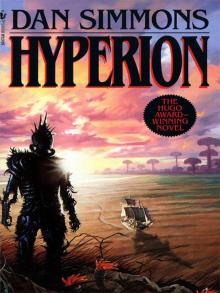 Hyperion
Hyperion The Crook Factory
The Crook Factory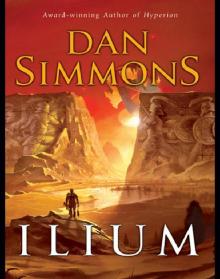 Ilium
Ilium Phases of Gravity
Phases of Gravity Hardcase
Hardcase Fires of Eden
Fires of Eden Children of the Night
Children of the Night Muse of Fire
Muse of Fire Drood
Drood The Fifth Heart
The Fifth Heart Carrion Comfort
Carrion Comfort The Hollow Man
The Hollow Man Summer of Night
Summer of Night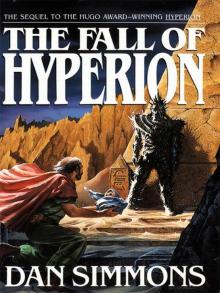 The Fall of Hyperion
The Fall of Hyperion Black Hills
Black Hills A Winter Haunting
A Winter Haunting Hard Freeze
Hard Freeze Prayers to Broken Stones
Prayers to Broken Stones Hard as Nails
Hard as Nails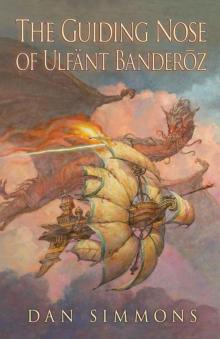 The Guiding Nose of Ulfant Banderoz
The Guiding Nose of Ulfant Banderoz The Rise of Endymion
The Rise of Endymion Orphans of the Helix
Orphans of the Helix Lovedeath
Lovedeath Olympos
Olympos Darwin's Blade
Darwin's Blade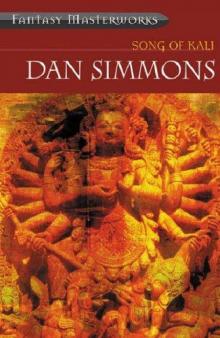 Song of Kali
Song of Kali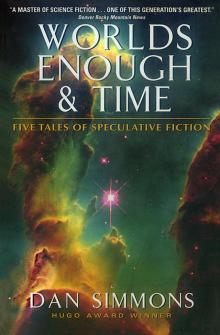 Worlds Enough & Time: Five Tales of Speculative Fiction
Worlds Enough & Time: Five Tales of Speculative Fiction The Abominable
The Abominable The Death of the Centaur
The Death of the Centaur Hard as Nails jk-3
Hard as Nails jk-3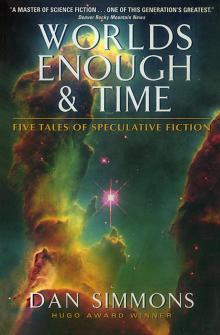 Worlds Enough & Time
Worlds Enough & Time Joe Kurtz Omnibus
Joe Kurtz Omnibus The Hyperion Cantos 4-Book Bundle
The Hyperion Cantos 4-Book Bundle Rise of Endymion
Rise of Endymion Hard Freeze jk-2
Hard Freeze jk-2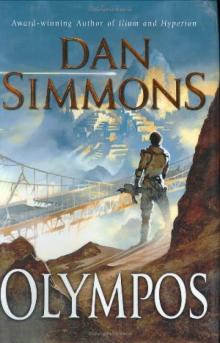 Olympos t-2
Olympos t-2 The Abominable: A Novel
The Abominable: A Novel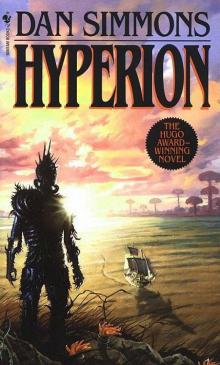 Hyperion h-1
Hyperion h-1 Remembering Siri
Remembering Siri Black Hills: A Novel
Black Hills: A Novel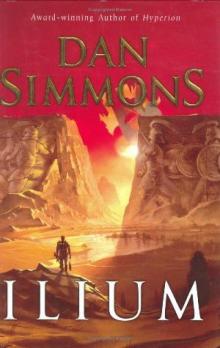 Ilium t-1
Ilium t-1 Hardcase jk-1
Hardcase jk-1 Hyperion 01 - Hyperion
Hyperion 01 - Hyperion